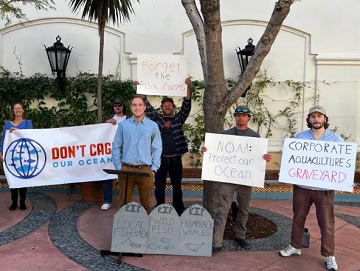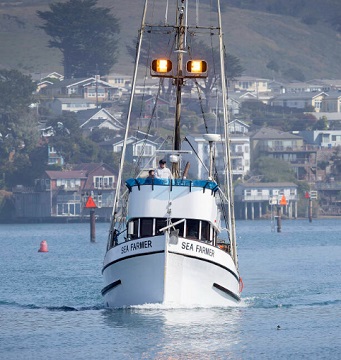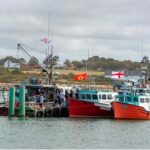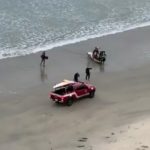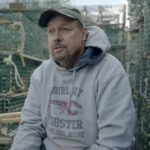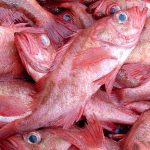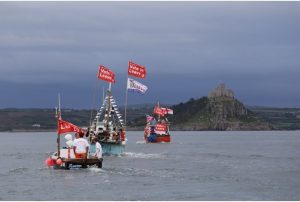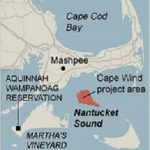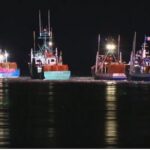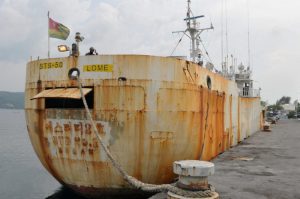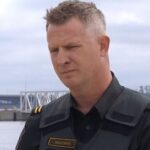Category Archives: Pacific
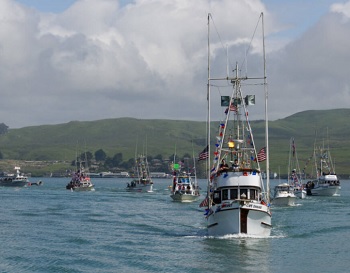
50th Bodega Bay Fish Fest to celebrate coastal fishing traditions despite salmon season closure
A two-day celebration of Bodega Bay’s fishing traditions will go on as usual this weekend, honoring the hardships and labor of the local commercial fleet, despite the setbacks of a curtailed crab season and a salmon fishery that has been shut down this year. Long scheduled to mark the start of the keystone king salmon season, the annual Bodega Bay Fisherman’s Festival, now in its 50th year, will fill the air with live music and the shouts and laughter of thousands of people gathered harbor-side for fun and games. For the commercial fishermen and women in whose honor the festival is held, it may be a more sober version than most. >click to read< 07:45
Athearn Marine Agency Boat of the Week: 68′ Desco Dragger W/State and Federal Permits, Cat 3408
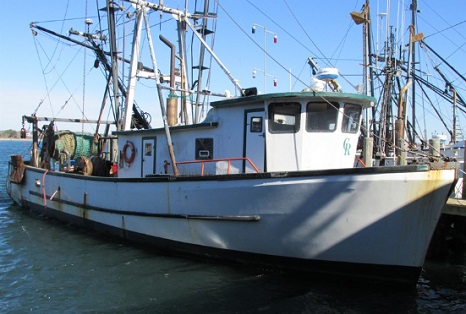 To review specifications, information, and 54 photos’, >click here<, To see all the boats in this series >click here< 11:36
To review specifications, information, and 54 photos’, >click here<, To see all the boats in this series >click here< 11:36
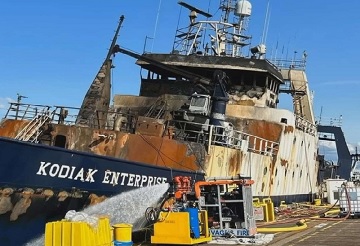
F/V Kodiak Enterprise: Crews removing water, chemicals from Tacoma fishing boat before investigating cause of fire
Crews extinguished the last of the fires Friday but investigators who will look for the cause still aren’t able to set foot on the boat. Officials said a few things need to happen first, like the removal of the gas, oil, and water still on the vessel. “Right now, the biggest priority is dewatering the vessel to right it, ” said U.S. Coast Guard Petty Officer Steve Strohmaier. The 276-foot Kodiak Enterprise still lists to one side. It’s because of the water poured into the boat to put out the flames. Getting that water and other potentially damaging chemicals off the boat is the new priority. >click to read< 07:29
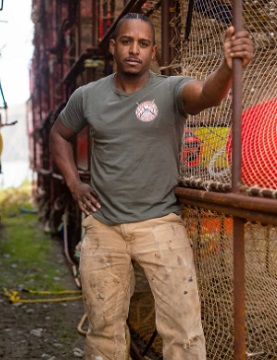
WA deckhand joins ‘Deadliest Catch’s’ 19th season
Jacob Hutchins, a 33-year-old deckhand from Olympia, joins the “Deadliest Catch” cast in its 19th season with one goal: to become the first, as far as he knows, African American crabbing captain on the Bering Sea. Premiering at 8 p.m. April 18 on Discovery Channel, “Deadliest Catch” introduces new characters on each boat with Hutchins paired with Keith Colburn, captain of the Wizard. “He’s got experience, but he’s untested on the Wizard,” Colburn said in preview of the new season that aired last week. A 2008 graduate of Bremerton High School, Hutchins found himself in Grays Harbor County where “you have logging and fishing [as options] if you want to make some money without any real requirement or anything.” >click to read< 09:08
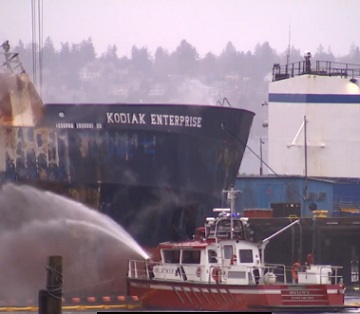
Fire aboard F/V Kodiak Enterprise in Tacoma put out after burning 6 days
A fire that burned aboard a ship in Tacoma for six days has been put out. The unified command, which is made up of several local and state agencies, announced Friday that the fire aboard the F/V Kodiak Enterprise, which is owned by Trident Seafoods, is no longer burning. The next step is removing the fuel that remains on board. Once the fuel is removed, the work will become a general salvage operation, according to the Washington state Department of Ecology. Video, >click to read< 09:01
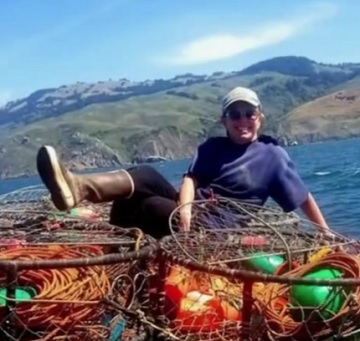
Bay Area restaurants, crabbers prepare as whales force Dungeness crab season to close early
In an effort to protect humpback whales, the California Department of Fish & Wildlife announced commercial crab season in the region will come to a close on Saturday. “Being on the Wharf and in this restaurant all my life, we take a lot of pride in being able to go down to the boats, bring it back, serving the freshest fish possible,” said Paul Capurro, owner of Capurro’s Restaurant. “I think crab is one of the big things that makes Fisherman’s Wharf, Fisherman’s Wharf.” Local crabbers will see less revenue without spring fishing, said Holly Fruehling. “I for one was very excited to be spring fishing this year,” Fruehling said. Video, >click to read< 08:02
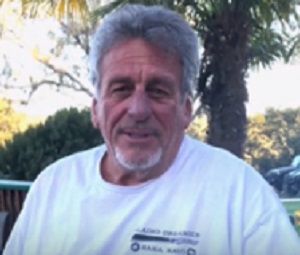
City of Morro Bay seeking answers on nearby offshore wind project
The offshore wind farm would be about 30 miles northwest of Morro Bay, but the project could have direct impacts on city infrastructure and the environment. “The city very much is concerned and wants to be better educated about the potential effects or impacts on the city and on the harbor,” said Morro Bay Interim City Manager Greg Carpenter. Not everyone is happy with the proposal. Some welcome an extra source of clean energy while others are worried about impacts to the marine environment and the local fishing industry. “We got a humpback highway right outside Morro Bay. We have tons of mammals out there and we don’t know what’s going to happen to them,” said Tom Hafer, President of the Morro Bay Commercial Fishermen’s Organization. Video, >click to read< 09:35
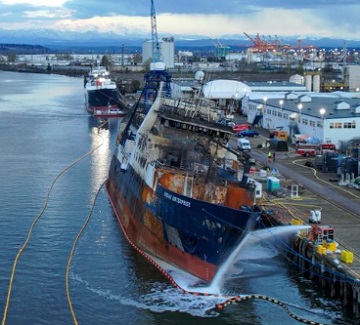
F/V Kodiak Enterprise: Firefighters extinguish hot spots, prepare to scale back response to fishing boat fire in Tacoma
The fire on the 276-foot vessel Kodiak Enterprise started at around 3:30 a.m. Saturday while the boat was moored at Trident Seafoods in the Hylebos Waterway, according to a news release from the U.S. Coast Guard. The fire department is currently working on a demobilization plan to scale back its response to the incident. “Now that it’s safe, we’re actually putting people in those individual rooms [of the vessel] again. Things have cooled down, and we’re actually able to go compartment by compartment and check those off,” said Magliocca. “It seems like there’s no pressure on the tanks that we’ve been worried about, the freon tank and the fuel tank.” Photos, >click to read< 08:05
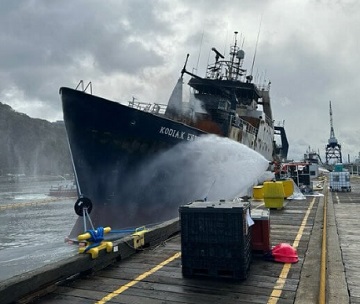
Fire Subsides Aboard Factory Trawler F/V Kodiak Enterprise
Firefighters have begun the process of knocking down the last remaining pockets of fire aboard the factory trawler F/V Kodiak Enterprise, which caught fire at a pier in Tacoma early Saturday. The fire burned through most of the vessel by Monday and decreased further in size on Tuesday, according to the unified command managing the response. The blaze has subsided enough that the Tacoma Fire Department green-lighted operations to access the ship’s interior and begin extinguishing any remaining hot spots. The vessel still has a pronounced list to port, but dewatering operations are under way to restore full stability. A dive inspection on Tuesday found that the ship is intact below the waterline, dispelling earlier concerns that she might be taking on water. Photos, >click to read< 10:47
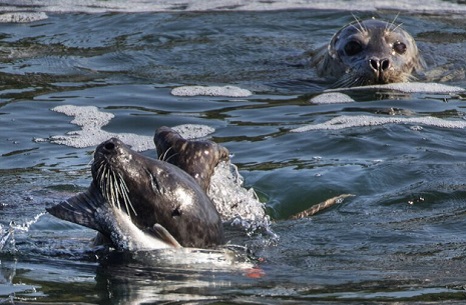
Battle over endangered fish has led Oregon to cull sea lions
While sea lion populations in the Pacific Northwest have soared in recent decades, salmon and steelhead numbers have not. And sea lions’ voracious appetite for salmon is the issue at hand. Many of the fish that sea lions eat are among 13 threatened and endangered runs protected under the federal Endangered Species Act. And groups of sea lions have taken to simply waiting at the Bonneville Dam, Willamette Falls and other pinch points where the fish gather as they struggle to make their way upriver to spawn. The Oregon Department of Fish & Wildlife estimates that sea lions eat up to 44% of the Columbia River spring Chinook run and 25% of the Willamette winter steelhead run each year. Video, >click to read< 09:11
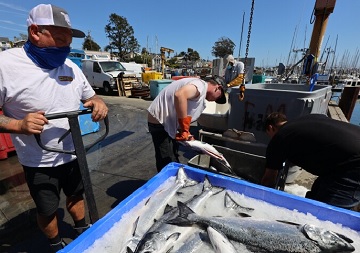
‘Disaster of a season for us’: Cancellation ripples through California salmon fishery
California’s salmon fishermen are seeking federal disaster aid after getting the word that the 2023 commercial and recreational salmon season has been canceled. It comes as projections show record-low salmon stocks, and regulators say the closure is needed to ensure maintenance of a healthy salmon population. Much of the fishing in Oregon has also been canceled. “It’s obviously a disaster of a season for us,” said Tim Obert of Ben Lomond, who has been fishing salmon commercially for close to two decades. “It takes our living away.” >click to read< 17:28
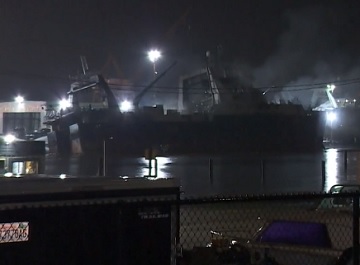
F/V Kodiak Enterprise: Day 3 – Fire crews prioritizing keeping burning Tacoma ship from capsizing
The ship is visibly leaning to the port side, “more than we want it to,” officials said on Monday. The ship is taking on water, but crews working on scene aren’t sure how. Work is underway to pump water out of the ship so it remains stable. A dive operation is also underway so the hull of the ship can be inspected. In the meantime, as the fire continues burning inside, firefighters are keeping their distance. “We’re trying to limit the number of people that go on board,” said Todd Magliocca, an operations leader with Tacoma Fire. Applying water from the inside is risky as crews are trying to prioritize keeping the ship upright. Video, >click to read< 10:32
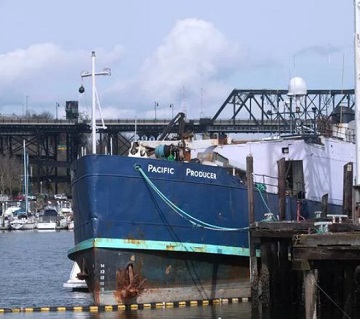
Ship with history of safety, pollution violations moored indefinitely in Tacoma
A 77-year-old fishing ship with a reputation of pollution and safety violations has been docked on the Foss Waterway in Tacoma since August after smashing into a private pier and raising concerns about its integrity. Its owner said he doesn’t know when it will leave. The fishing vessel Pacific Producer arrived at its current location on Aug. 29, according to a nearby condo resident. The 472 gross ton, 169-foot-long boat was built in 1946 and has been working in Alaskan waters until recently. It’s registered to East West Seafoods of Seattle. “Working in the Alaskan fishing industry – an occupation already regarded as one of the nation’s most dangerous – employees aboard the F/V Pacific Producer faced dangers purely of their employer’s making,” >click to read< 09:23
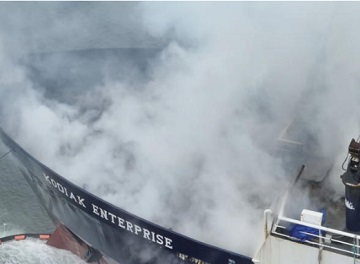
F/V Kodiak Enterprise: Shelter-in-place remains in effect as fishing boat fire continues to burn
A massive fishing boat fire in Tacoma just northwest of Chinook Landing Marina continues to burn Monday. On Monday morning, smoke from the fire continued but had visibly lessened. The fire on the 276-foot vessel Kodiak Enterprise started at around 3:30 a.m. Saturday while the boat was moored at Trident Seafoods in the Hylebos Waterway. Trident Seafoods said there were three people on board the ship when the fire started but they made it out safely without any injuries. The cause of the incident is under investigation. Photos, >click to read< 11:42
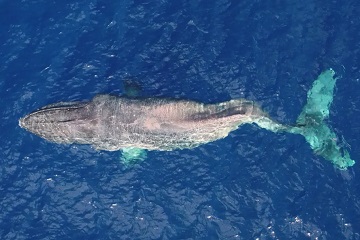
Ship Strikes: Thousands of whales are being killed by passing ships. Can we save them?
A collision with a vessel is one of the main threats to whales and if the whale does not die on impact, it is usually only a question of time. In Moon’s case, Wray knows she made the 3,000 mile migration to Hawaii. “We’re actually hoping that she has passed,” says Wray. She has not been seen since December. With potentially thousands of whales hit every year, and with the number of ships rapidly increasing across the globe, the problem is only getting worse. But as the recent UN high seas treaty shows, there is increasing political will to protect the world’s oceans and their inhabitants. The question is whether it is even possible to save the whales from dying at the bows of ships. New technology suggests yes – but it’s going to take all hands on deck. >click to read< 08:01
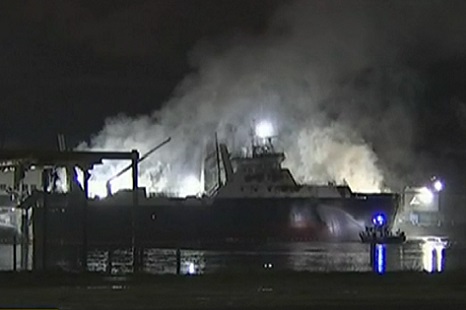
Authorities respond to fishing vessel fire in Tacoma; shelter-in-place order issued for nearby areas
The Tacoma Fire Department has issued a temporary shelter-in-place order for some areas after a fishing vessel caught fire early Saturday morning, according to a news release from the U.S. Coast Guard. The order applies to the Northeast Tacoma, Browns Point and Dash Point neighborhoods. Residents in these areas are advised to stay indoors and limit exposure to smoke. The Coast Guard has closed the Hylebos Waterway to all commercial and recreation vessel traffic at this time and has deployed the Coast Guard Cutter Osprey and Station Seattle to enforce the closure. 17 photos, >click to read< 20:39
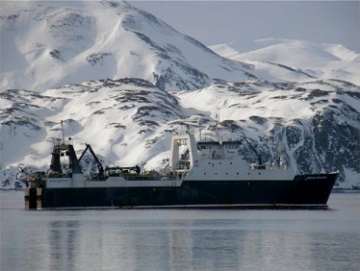
Unified command responds to fishing vessel fire in Tacoma, Washington
The Tacoma Fire Department, the Coast Guard, the Environmental Protection Agency, the Washington Department of Ecology and other agencies are continuing their response to the fishing vessel, F/V Kodiak Enterprise, that caught fire early Saturday morning while moored at Trident Seafoods in the Hylebos Waterway in Tacoma. The fire has progressed throughout the ship and was last reported approximately 100 feet from the vessel’s freon tanks. The vessel is reported to have an estimated 55,000 gallons of diesel and 19,000 pounds of freon onboard. The heat from the fire can cause pressure to build in the freon tanks. >click to read more< 17:44
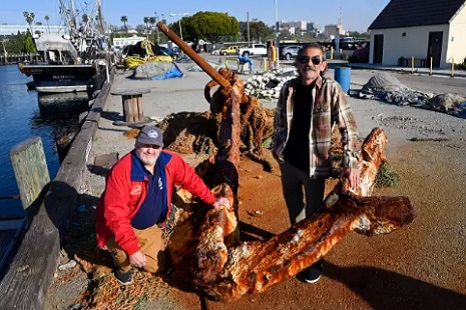
San Pedro fisherman pulls up a mammoth relic from the past
Talk about an epic haul. It was a beautiful fall day in mid-November when San Pedro fishing boat skipper Vince “Enzo” Lauro and his five-man crew on the 70-foot-long St. Joseph headed out for what was to be a routine day collecting squid. But what they wound up hauling onboard nearly rolled the vessel: An old, 8,000-pound anchor that had been sucked down long ago into the ocean floor several miles off the Long Beach breakwater opening. Lauro, 59, described the find succinctly: “Crazy.” 6 photos, >click to read< 14:58
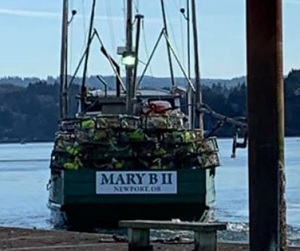
F/V Mary B II: Why Coast Guard sluggishness?
It has been more than four years since the deadly capsizing of the crabbing vessel F/V Mary B II while attempting to cross the Yaquina Bay bar inbound in stormy weather on Jan. 8, 2019, killing the skipper and two crew members as Coast Guard vessels were nearby. A Coast Guard Marine Casualty Investigation board convened in Newport, May 13-17, 2019, and soon revealed the captain had alcohol and methamphetamine in his system and one crew member had cannabinoids. The captain had previously operated off New Jersey and wasn’t very familiar with Pacific Coast conditions. >click to read< 13:03 Search Results for F/V MARY B II
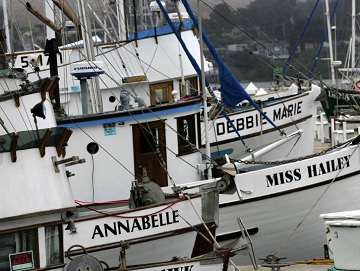
State, federal officials vow to take quick action on Federal Fishery Disaster Declaration for salmon fishing industry
State and federal officials are vowing to move quickly to secure disaster aid for Californians affected by the closure of this year’s commercial and recreational salmon season, which could have an economic impact of $1.4 billion, according to one industry group. The administration of Gov. Gavin Newsom requested a Federal Fishery Disaster Declaration from U.S. Commerce Secretary Gina Raimondo after a decision Thursday by the Pacific Fishery Management Council to recommend full closure of both commercial and recreational salmon seasons this year. It’s unclear what that might mean in terms of total dollars and eligible stakeholders. >click to read< 08:03
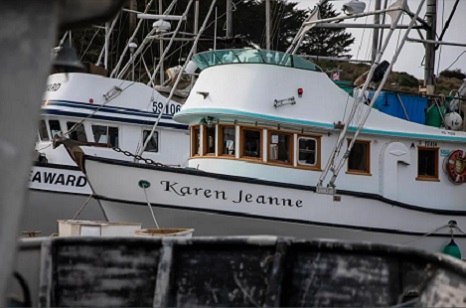
California could have avoided salmon season shutdown. Did we learn nothing last time? by Sarah Bates
I fish salmon commercially from Fisherman’s Wharf in San Francisco. You can see the Golden Gate Bridge from my boat, where Chinook have passed for millions of years on their journey from the ocean, through the bay and Delta, up the Sacramento River. There is communal anticipation before the first trip of the summer, checking anchor winches and hydraulic hoses, safety equipment, leaders, weather reports. Boats are freshly painted and deck tanks for holding fish are installed. Not this year – this year feels like a funeral. >click to read< by Sarah Bates 09:52
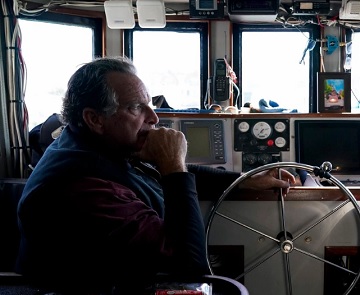
Pacific Fishery Management Council approves salmon fishing ban for much of West Coast
A federal regulatory group voted Thursday to officially close king salmon fishing season along much of the West Coast after near-record low numbers of the fish, also known as chinook, returned to California’s rivers last year. The Pacific Fishery Management Council approved the closure of the 2023 season for all commercial and most recreational chinook fishing along the coast from Cape Falcon in northern Oregon to the California-Mexico border. Limited recreational salmon fishing will be allowed off southern Oregon in the fall. Biologists say the chinook salmon population has declined dramatically after years of drought. Though the closure will affect tens of thousands of jobs, few are opposed to it. Many fishers say they want to take action now to guarantee healthy stocks in the future. >click to read< 09:03
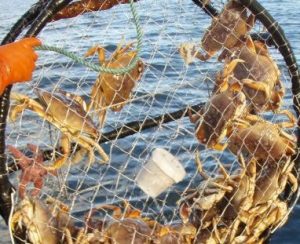
For Whales and Crabbers, Finding Balance Is Getting Harder
In Dick Ogg’s 25 years of commercial fishing, he’s had a few close encounters with whales—mostly while pulling Dungeness crab pots off the ocean floor. “I’ve had whales right next to me,” within about five meters, says Ogg. “They follow me, they watch, they’re curious. And then they go on about their business.” Ogg is fortunate his interactions have been so leisurely. For nearly a decade, California’s whales and crabbers have been locked in a persistent struggle. From 1985 to 2014, the National Oceanic and Atmospheric Administration (NOAA) reported an average of 10 whales were entangled in fishing gear each year along the west coast of the United States. >click to read< 07:53
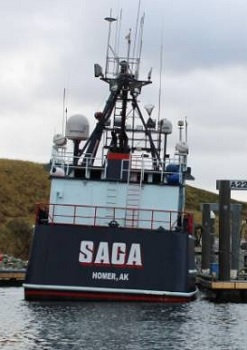
Why would a pediatric neurosurgeon go crab fishing in the Bering Sea?
The fears and anxieties associated with my role as a pediatric neurosurgeon are those related to my patients’ lives I have put at risk during the past 20 years. The last decade presented an opportunity for me to learn something from the commercial fishing industry about life circumstances where we experience fear and anxiety. In 2009, I was privileged to work on the F/V Miss Colleen, a commercial salmon fishing gillnet boat in Bristol Bay, Alaska. Then, in the fall of 2019 and winter of 2021, I was fortunate to be a deckhand on the F/V Saga, a commercial crab fishing boat in the Bering Sea profiled on the Discovery show Deadliest Catch. Both experiences had a profound effect on me and taught me how to switch from a “my life is at risk” mentality to one focused on preventing mistakes from happening through teamwork and effective communication. It occurred to me that there is no room for error in both the health care and commercial fishing industries. Both giving a patient the wrong medication or going overboard in rough seas can lead to death. >click to read< 18:08
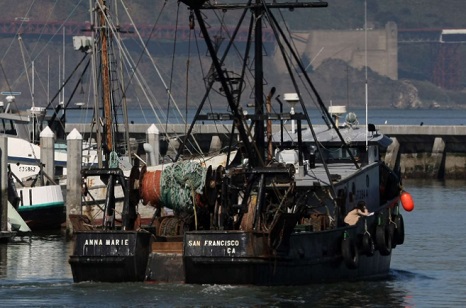
Oregon Fishing Industry Fed Up With Agency ‘Ignoring’ Their Offshore Wind Concerns
The West Coast Seafood Processors Association, the Midwater Trawlers Cooperative and the Oregon Dungeness Crab Commission claim their concerns about proposed offshore wind project call areas, areas where the agency is seeking public comment, and their impact on key fish populations due to the turbines’ electromagnetic field (EMF) cables, have been ignored by BOEM. They also worry about the impact offshore winds would have on their businesses and the entire state’s economy. “BOEM has told us that if Oregon doesn’t want this, they will back off and pursue other offshore wind areas, and we’ve made it pretty clear to them that Oregon doesn’t want this, and they’re still pushing forward,” Lori Steele, executive director of the seafood trade group West Coast Seafood Processors Association, told the DCNF. “They are giving us nothing but lip service,” she added. >click to read< 09:43
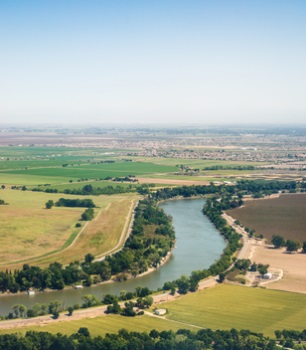
Salmon fishermen reflect on causes, future as closure looms
Earlier this year, Governor Gavin Newsom signed an executive order urging California’s water board to waive environmental laws and reserve water for future agricultural use, that would otherwise be released to help insure the survival of native fish and wildlife species. “The politics of water mismanagement readily and consistently traverses party lines,” Davis said. “So we’re trying to get equitable allocation of the resource to the different sectors, agricultural, residential, and environmental, which supports the salmon.” Tim Obert, a salmon fisherman based out of Santa Cruz, said the ramifications of the closure could be devastating. >click to read< 10:16
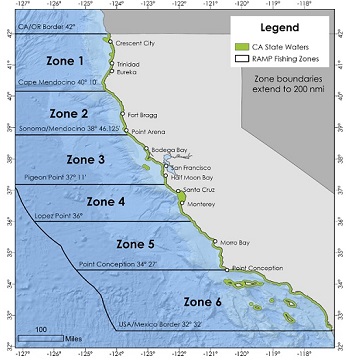
CDFW Announces Closure Of Commercial Dungeness Crab Fishery Off Central California To Protect Humpback Whales
California Department of Fish and Wildlife (CDFW) Director Charlton H. Bonham has assessed entanglement risk under the Risk Assessment Mitigation Program (RAMP) and announced a fishery closure for the commercial Dungeness crab fishery in fishing zones 3, 4, 5 and 6 (Sonoma/Mendocino county line to the U.S./Mexico border) effective at noon on April 15, 2023. The take and possession of Dungeness crab is therefore prohibited after noon on April 15, 2023, in fishing zones 3-6. This season closure is being implemented to minimize entanglement risk for humpback whales as they return to forage off the coast of California and in response to several entanglements that occurred during March and April of 2022. >click to read< 06:53
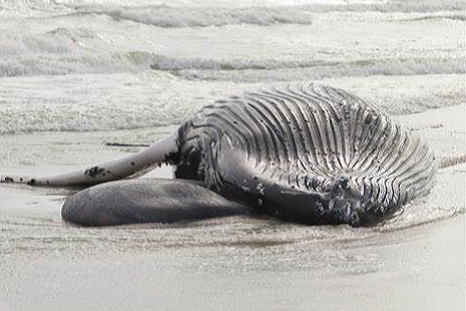
Dem senators from 4 states ask NOAA to address whale deaths
Democratic U.S. Senators from four states want federal environmental officials to address a spate of whale deaths on both coasts, urging “transparency and timeliness” in releasing information about whale deaths and their causes. The call late Tuesday by New Jersey Sens. Robert Menendez and Cory Booker; Connecticut Sen. Richard Blumenthal, Oregon Sen. Jeff Merkley, and Rhode Island Sen. Sheldon Whitehouse for action by the National Oceanic and Atmospheric Administration marked the first large-scale request for action by Democratic federal lawmakers on an issue that has rapidly become politicized. Thus far, mostly Republican lawmakers have called for a pause or an outright halt to offshore wind farm preparation work, which they blame for the deaths of whales along the U.S. East Coast since December. But in their letter to a NOAA administrator, the Democratic senators conspicuously did not blame — or even mention — offshore wind as a potential cause of the deaths. >click to read< 16:52






